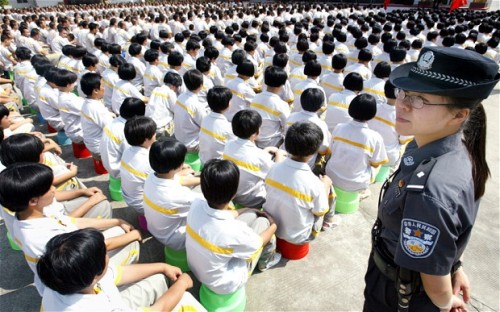
Associated Press/Fernando Llano, File – FILE – In this Oct. 20, 2011 file photo, Venezuela’s President Hugo Chavez speaks to soldiers in La Fria, Venezuela.
Associated Press | Jan 17, 2013
By FABIOLA SANCHEZ
CARACAS, Venezuela (AP) — In a country riven by political strife, Venezuela’s military often has served as the arbiter of power. It has launched coups and frustrated them and dispatched soldiers to guarantee stability, distributing food, fighting crime and securing oil fields.
Now with President Hugo Chavez battling for his life, the stance of the 134,000-strong armed forces again will be crucial.
Divisions within the military have clouded attempts to determine who it might support among Chavez loyalists or if it would side with the opposition. While the military’s leadership is packed with Chavez supporters, the officer corps may not be so loyal. Much will depend on what Chavez’s political heirs do in the coming weeks.
Experts and former military officers agree that the governing duo of Vice President Nicolas Maduro and National Assembly President Diosdado Cabello has been unable to fill the leadership vacuum created by Chavez’s five-week absence and silence. Without a commander in chief, there is no one to ensure unity or guarantee continued loyalty through promotions and retirements.
Retired army Gen. Antonio Rivero was one of the first to sound the alarm about the leadership gap when he told the Venezuelan news website Noticias24 that if Chavez didn’t return from Cuba for his Jan. 10 swearing-in, the armed forces from that point on would “not have a commander in chief.” He’s since gone into hiding after state intelligence agents came to his house looking for him. He said in an interview that he had sparked government ire by accusing it of letting Cubans influence the military.
Maduro, for his part, has repeatedly tried to put to rest any questions about the military’s loyalties by rallying troops and publicly appearing alongside top brass.
On Wednesday, the vice president celebrated the supposed support of hundreds of soldiers gathered at the Fort Tiuna military base in Caracas. At the end of the televised speech, a band struck up a folk song and soldiers clapped in time to the lyrics “Onward, commander!”
“(Chavez) told us to transmit from his heart to the Bolivarian national armed forces all his appreciation for so much loyalty toward him as a humble soldier of this country,” Maduro said. “Thanks to everybody for so much loyalty and for so much love.”
The vice president also said on Thursday that Chavez had authorized the equivalent of $372 million in financing to be provided as auto loans for soldiers. Maduro said that “20,000 military families are going to have their personal car with a loan with good terms.”
Opposition leader Henrique Capriles has also trumpeted his military ties, announcing last week in a news conference that he has been in touch with officers and suggested they would step in to ensure leaders follow the country’s laws governing what should happen in a transition.
The military, like the rest of the country, is in limbo, awaiting the outcome of Chavez’s fourth cancer surgery.
Government officials have insisted they can indefinitely postpone the president’s swearing-in, which the constitution had set for Jan. 10, as long as he’s physically incapacitated. Opposition leaders say the move is unconstitutional although it was ratified by the Supreme Court.
“The Armed Force also has a role to play here … of respecting the constitution,” Capriles said during a news conference.
Throughout his 14 years in power, Chavez has proved masterful at commandeering support both inside and outside the military. With his natural political touch and ramped-up public aid programs, Chavez has easily won re-election three times, including in October when he defeated Capriles with 55 percent of the vote.
Since taking office in 1999, Chavez has attempted to transform the rank and file into defenders of his socialist-inspired policies. After a 2002 coup that included rebellious soldiers briefly dislodged him from power, Chavez returned to the presidential palace only after loyalists within the military stepped in to put down the uprising, and he subsequently promoted allies.
Chavez also has defended officers accused by the U.S. of drug trafficking and blasted what he’s said is fabricated evidence against them.
Chavez’s government is replete with military brass, including seven of 29 Cabinet ministers. When Chavez’s allies swept the country’s gubernatorial elections in December, 11 of the country’s 23 governorships ended up in the hands of former military officers allied with the president.
If he dies or otherwise leaves power, the country’s constitution requires an election be called within 30 days to replace him, which could unleash a power struggle.
What may ultimately guide the transition is the complex mix of loyalties among both top leadership and lower-ranking officers, said Rocio San Miguel, president of the nonprofit group Citizen Control for Security, Defense and the Armed Force.
A former paratrooper, Chavez enjoys explicit support from his two top military leaders, Defense Minister Adm. Diego Molero and chief strategic operational officer, army Gen. Wilmer Barrientos, both of whom the president appointed.
Cabello, who’s a close Chavez ally and former army lieutenant, can also count on officers promoted by the country’s main military academy around 1987, the year of his class. Retired Adm. Ivan Carratu estimated more than 85 men from that class, out of hundreds of high-ranking officers, are serving in command posts around the country.
But while the top leadership is solidly pro-Chavez, the loyalties of some 8,500 to 10,000 middle- and low-ranking officers remain unknown, San Miguel said, and they could determine the military’s posture.
“We are clearly in a transition in Venezuela and what’s to be defined is what is the real alternative to power, first within Chavismo and secondly, with regard to the opposition’s aspirations,” San Miguel said.
Opposition politicians insist that many in the armed forces are unhappy with Chavez for introducing Cuban officials among their ranks and for failing to improve soldiers’ low wages and poor benefits.
Carratu told The Associated Press that more than 100 officers, largely colonels, have been kept out of active duty after being identified as unsympathetic to Chavez’s policies. He added that the authorities hope to retire many of them after two years out of active duty.
Carratu said another batch of officers is not aligned with any political movement and consider themselves loyal only to the constitution.
“There exists a group of soldiers … where what’s totally and absolutely important is the army,” Carratu said. “It’s where there isn’t visible authority.”
Another question complicating any transition is a 125,000 person-strong civilian militia that the Chavez government has cultivated as a shadow army defending his programs. San Miguel estimated that about 30,000 of them could be considered armed combatants.
Under the command of a Chavez-appointed army general, the militia represents “a threat to the civilian population that decides to protest peacefully,” she said.
At least for now, the military appears to be playing its historic part by ensuring peace, said Diego Moya-Ocampos, a political analyst with the London-based economic consultancy IHS Global Insight.
“In the current scenario of weak institutions in Venezuela, the armed forces plays a role of a sort of constitutional police that guarantees the constitution and the democratic process,” Moya-Ocampos said. “The military is committed to political stability and to the Venezuelan Constitution.”
“There are tensions behind the scenes but not strong enough yet to fragment the armed forces.”
San Miguel, however, suggested the military simply may be waiting until the president’s departure to make any move, as are all the players in Venezuela’s post-Chavez chess game.
When will it finally reveal its plans? “Not until there’s a real alternative of power,” San Miguel said.



 What a year 2012 has been! The mainstream media continues to tell us what a “great job” the Obama administration and the Federal Reserve are doing of managing the economy, but meanwhile things just continue to get even worse for the poor and the middle class. It is imperative that we educate the American people about the true condition of our economy and about why all of this is happening.
What a year 2012 has been! The mainstream media continues to tell us what a “great job” the Obama administration and the Federal Reserve are doing of managing the economy, but meanwhile things just continue to get even worse for the poor and the middle class. It is imperative that we educate the American people about the true condition of our economy and about why all of this is happening. 





